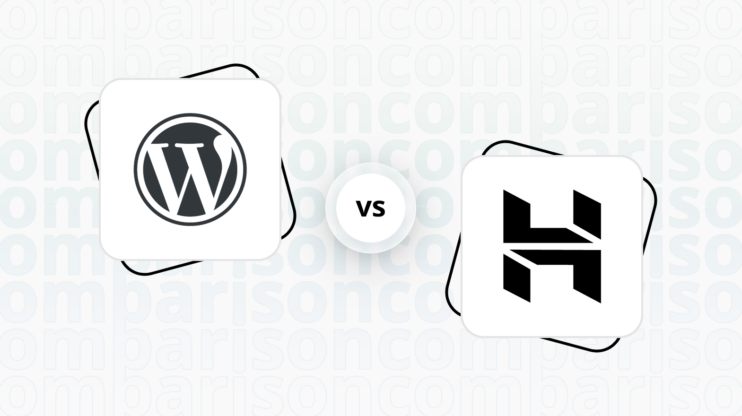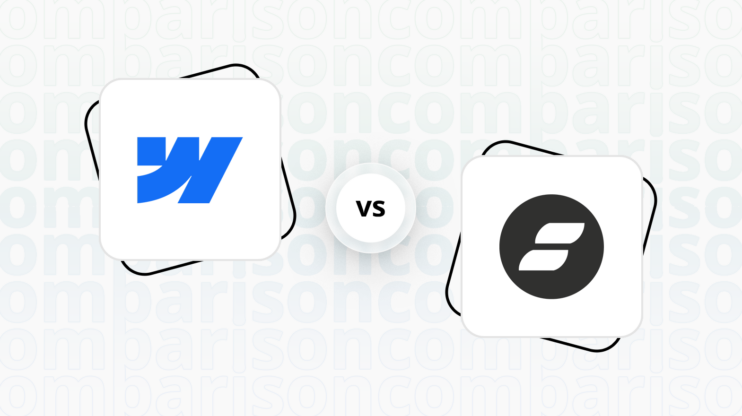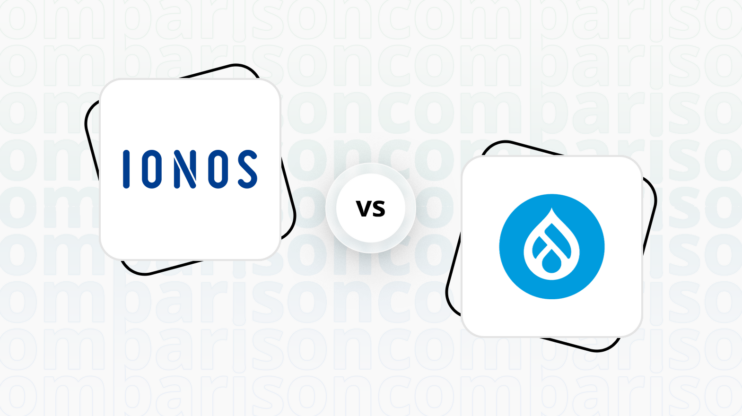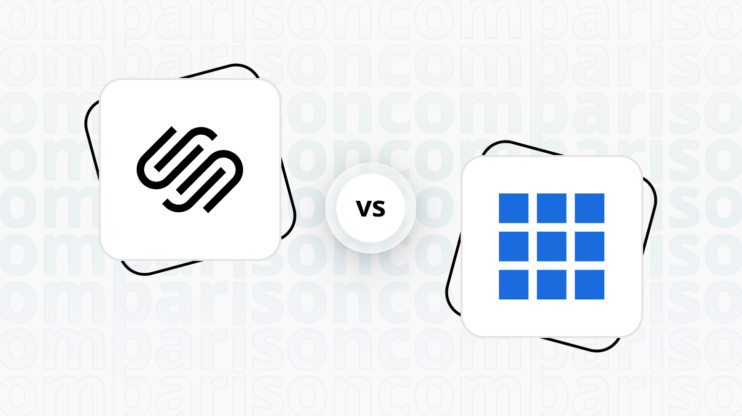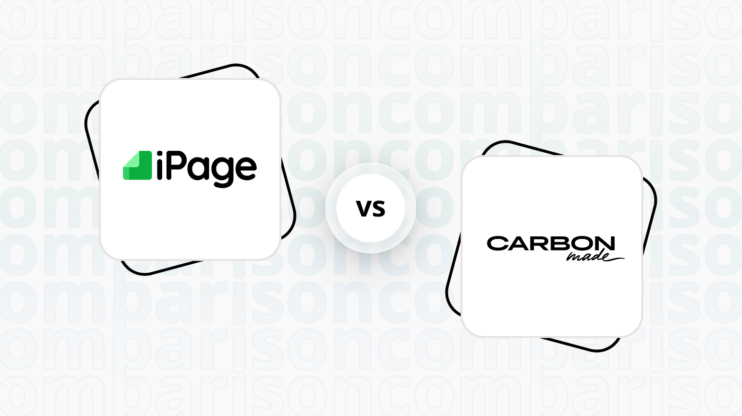Final verdict
Google Sites and BlueHost both offer unique advantages, but they cater to different user needs and preferences.
-
Google Sites (Overall Grade: 5.6/10)
is ideal for users seeking a simple, collaborative website builder with seamless integration with Google services. It excels in ease of use, security, and user management, making it a great choice for team projects, personal portfolios, and small business websites. However, it lacks advanced design customization, ecommerce features, and AI capabilities, which may limit its appeal for more complex website needs. -
BlueHost (Overall Grade: 6.8/10)
stands out for its comprehensive web hosting services and integration with WordPress, offering a wide range of templates, plugins, and customization options. It is particularly strong in ecommerce, website speed optimization, and marketing features, making it suitable for users looking to create professional-looking websites with advanced functionalities. However, its higher pricing and occasional technical issues may be a consideration for some users.

|

|
|
|---|---|---|
|
Design functionalities & templates |
4.9 |
7.2 |
|
Ease of use |
8.3 |
8.2 |
|
Ecommerce |
1.8 |
6.8 |
|
Website Editors |
7.0 |
7.3 |
|
Product testing options |
6.9 |
6.2 |
|
Price |
8.1 |
7.2 |
|
Hosting quality |
8.2 |
8.0 |
|
Website speed optimization |
3.3 |
6.5 |
|
Plugins and integrations |
6.4 |
9.1 |
|
Marketing features |
2.6 |
7.3 |
|
Customer support |
7.2 |
7.6 |
|
Security |
9.3 |
8.3 |
|
AI capabilities |
0 |
1.5 |
|
User Management |
7.8 |
4.4 |
Best for ecommerce
 1.8
1.8
 6.8
6.8
Verdict
: BlueHost is the clear winner for ecommerce, offering a robust set of features through its integration with WooCommerce, while Google Sites falls short with no built-in ecommerce capabilities.
-
Google Sites
: Google Sites is not designed for ecommerce. It lacks built-in ecommerce features and relies heavily on third-party integrations for any ecommerce functionality. This makes it less suitable for users looking to build an online store. When comparing Google Sites vs BlueHost, Google Sites is more appropriate for simple websites and team projects rather than ecommerce. -
BlueHost
: BlueHost excels in ecommerce with its integration with WooCommerce, providing features like product listings, shopping carts, secure payment gateways, and inventory management. It offers a variety of ecommerce templates and customization options, making it a versatile choice for building and managing an online store.
Best for informational & business websites
 7.2
7.2
 7.5
7.5
Verdict
: BlueHost slightly edges out Google Sites for informational and business websites, thanks to its extensive customization options and seamless WordPress integration.
-
Google Sites
: Google Sites is a straightforward tool for creating basic websites, especially for users who are already integrated into the Google ecosystem. Its drag-and-drop interface and easy integration with Google services make it ideal for team projects, personal portfolios, and small business websites. However, it offers limited design customization and fewer templates compared to BlueHost. Google Sites scored 7.2 in this category. -
BlueHost
: BlueHost offers a more versatile platform with its website builder that integrates seamlessly with WordPress. This allows users to access a wide range of templates and plugins, making it suitable for a variety of business needs. Its drag-and-drop interface is user-friendly, and the extensive customization options make it a strong contender for creating professional-looking websites. BlueHost scored 7.5 in this category.
Detailed comparison
Design functionalities & templates
Design FunctionalitiesRepresents how well each platform allows for creative design and customization of websites.Score Components:
- Template Variety (30%): Range and quality of design templates.
- Customization (30%): Flexibility and options for design alterations.
- User Interface (20%): Ease and intuitiveness of the design process.
- Responsiveness (10%): Adaptability to different devices and screen sizes.
- Innovation (10%): Unique design features and tools.
 4.9
4.9
 7.2
7.2
🏆
Winner: BlueHost.
BlueHost offers a wider variety of templates and designs, more creative design possibilities, and better customization flexibility compared to Google Sites.
Google Sites offers a limited number of templates suitable for various purposes, from personal blogs to business websites. These templates are designed for user engagement, simplicity, and functionality, allowing for customization to meet specific needs. However, compared to other website builders, Google Sites might offer less variety in templates and design customization options.
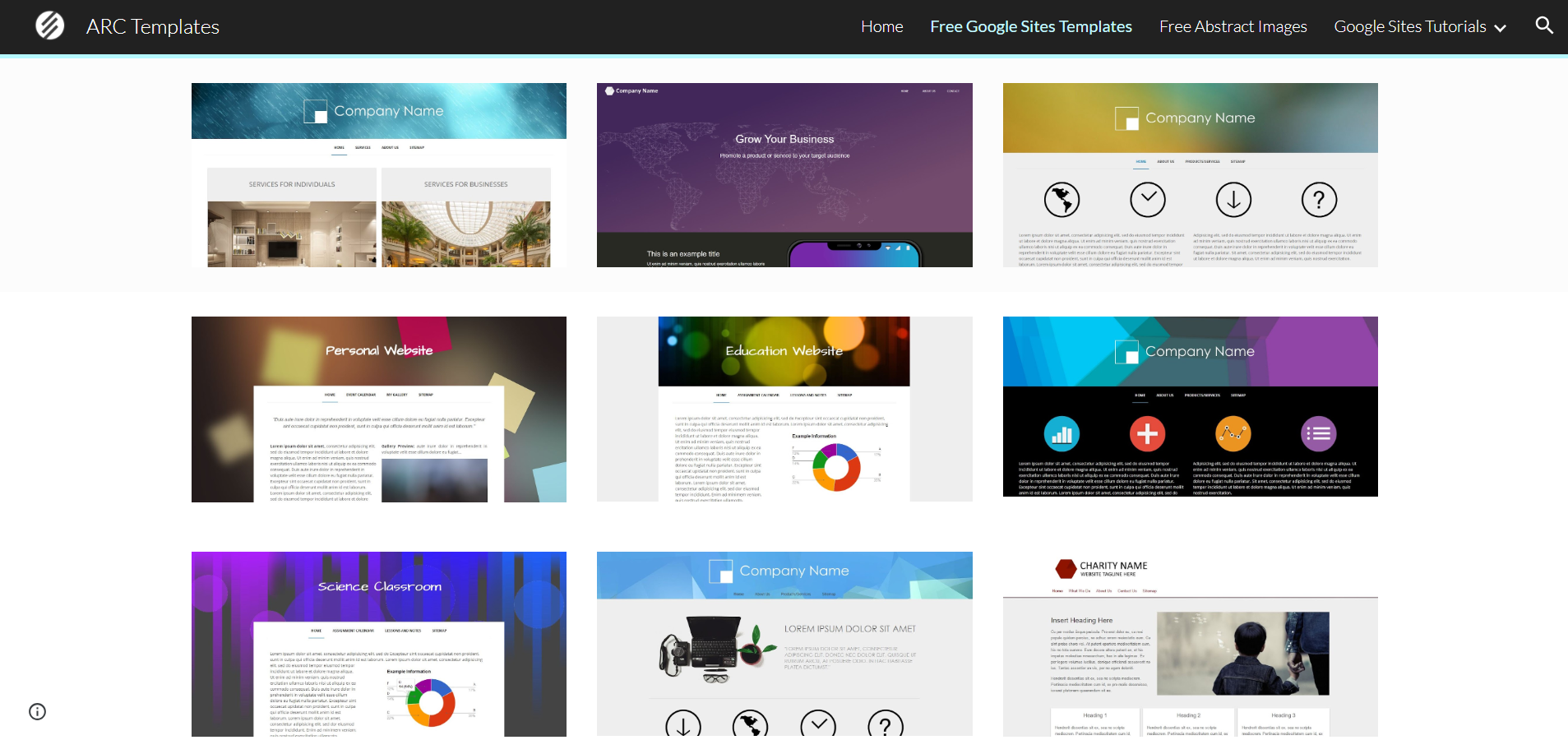

On the other hand, BlueHost’s WordPress website builder offers over 300 pre-installed templates and designs to cater to the diverse needs of its users, ensuring that there’s something for everyone, regardless of the niche or industry. With hundreds of customizable templates available, users can easily find a design that aligns with their vision and brand identity.
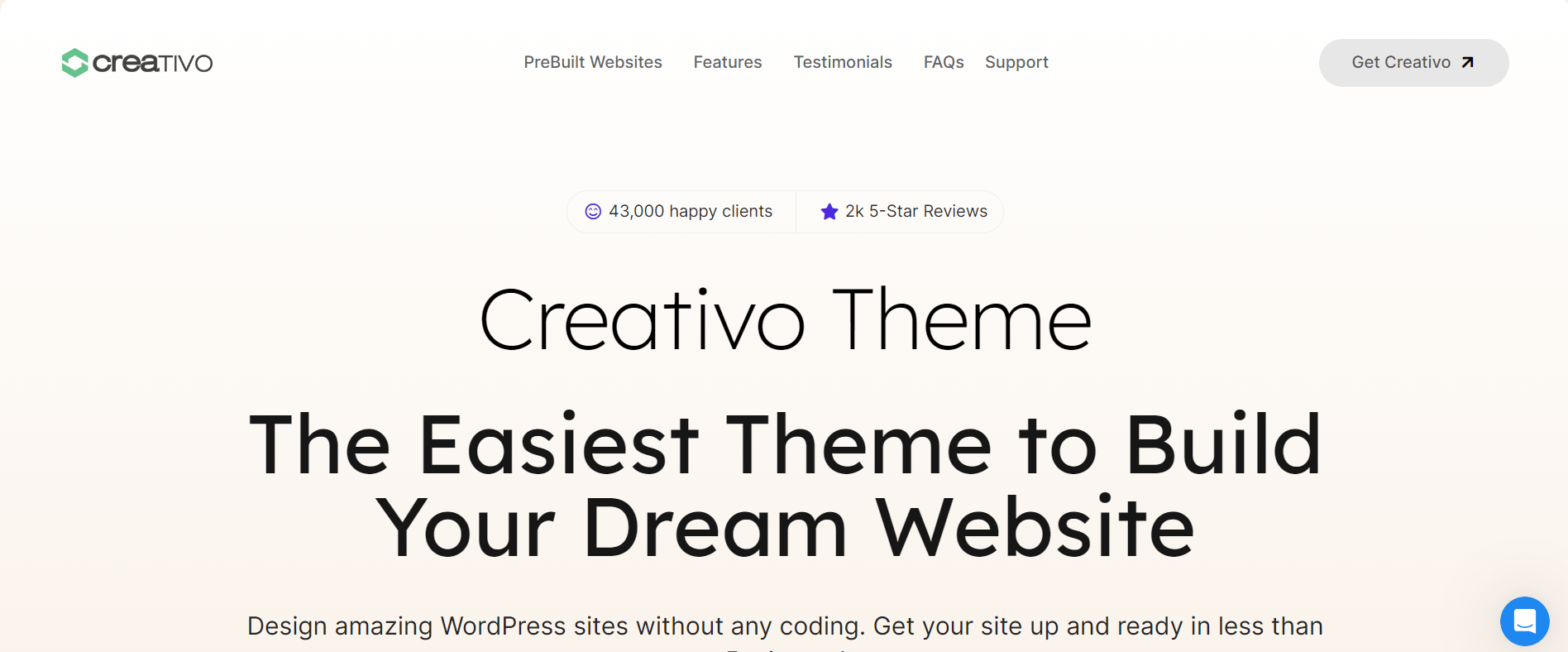
Get a head start on website creation with AI
Create a custom website tailored to your business needs 10X faster with 10Web AI Website Builder!
Ease of use
Ease of useReflects the platform’s overall user-friendliness.Score
Components:
- Learning curve (40%): Quickness and ease of getting started.
- Interface design (30%): Simplicity and intuitiveness of layout.
- User guidance (20%): Quality of tutorials and support.
- Flexibility (10%): Adaptability to various user skills.
 8.3
8.3
 8.2
8.2
🏆 Winner: Google Sites
. Scoring a close 8.3, Google Sites edges out BlueHost, which scored 8.2. Google Sites is praised for its user-friendly interface and seamless integration with other Google services, making it a straightforward tool for creating basic websites. BlueHost, on the other hand, offers a wide range of templates and customization options, making it a versatile option for a broad audience. If ease of use is a priority, Google Sites is the slight winner in this category.
Learning Resources
🏆 Winner: BlueHost
. While both platforms offer solid learning resources, BlueHost’s WordPress Academy stands out with its comprehensive courses developed by WordPress experts, making it easier for users to learn and adapt.
Community of Users
🏆 Winner: Google Sites
. Google Sites hosts several communities across different platforms, providing spaces for users to share tips, discuss challenges, and stay updated on the latest news and developments. BlueHost, on the other hand, has a smaller community. If community support is important to you, Google Sites is the clear winner in this category.
For ecommerce
EcommerceMeasures the platform’s effectiveness in supporting online business activities.Score Components:
- Ecommerce themes and templates (20%): Variety and design of templates.
- Product management (25%): Ease of managing and organizing products.
- Payment options (25%): Variety and convenience of payment methods.
- Ecommerce features (20%): Features for managing an ecommerce store.
- Integration (10%): Compatibility with external e-commerce tools and services.
 1.8
1.8
 6.8
6.8
When it comes to ecommerce, BlueHost clearly outperforms Google Sites. BlueHost’s integration with WooCommerce allows for a wide range of ecommerce features, including product listings, shopping carts, secure payment gateways, shipping options, tax calculations, and inventory management. Google Sites, on the other hand, does not have built-in ecommerce features and relies on third-party integrations for ecommerce functionalities.

|

|
|
|---|---|---|
|
Ecommerce themes and templates |
0.0 |
6.5 |
|
Product page customization |
0.0 |
7.0 |
|
Payment processing and commissions |
1.0 |
6.8 |
|
POS capabilities |
0.0 |
0.0 |
|
Payment gateways |
2.0 |
7.5 |
|
Product numbers |
0.0 |
6.0 |
|
Additional ecommerce features |
0.5 |
6.5 |
Google Sites ecommerce features:
Google Sites itself does not have built-in eCommerce features.
BlueHost ecommerce features:
- Product Listings
- Shopping Carts
- Secure Payment gateways
- Shipping Options and Tax Calculations
- Inventory Management
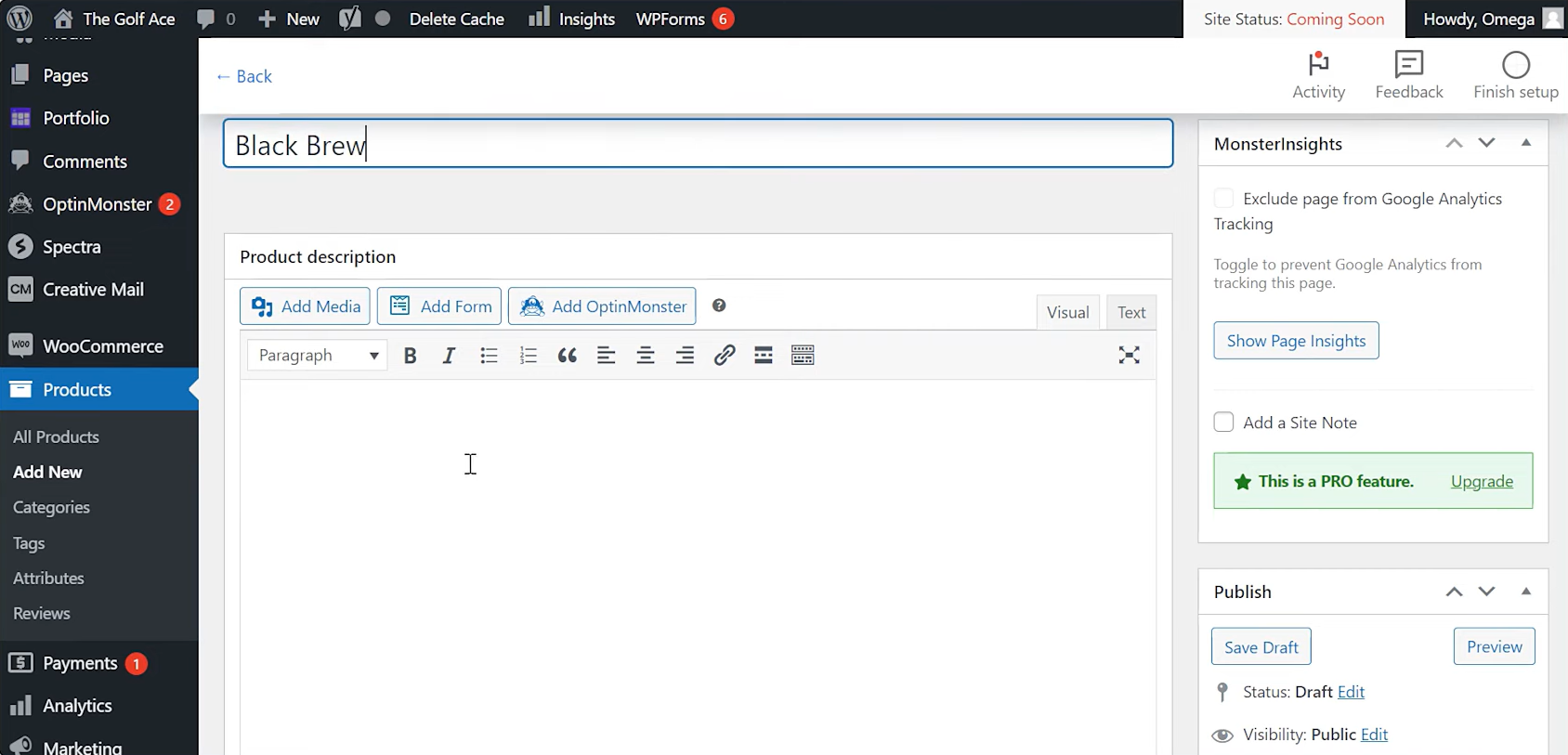
Ecommerce themes & templates
Google Sites does not offer any ecommerce templates. On the other hand, BlueHost provides a selection of templates designed specifically for online stores. These templates are optimized for sales, featuring designs that accommodate product galleries, shopping carts, and checkout processes. However, the customization options might be limited compared to more specialized ecommerce platforms.
Product page customization
Google Sites lacks any product page customization features. All product listings are done through third-party platforms, and customization can only be done within these platforms. In contrast, BlueHost offers robust customization features for product pages, allowing users to tailor product details like titles, descriptions, images, and pricing according to their preferences. It also supports the creation of product variants and options, and allows for the integration of customer reviews and ratings.
Payment processing
Google Sites does not have native payment processing features. Instead, it allows for the integration of payment gateways using external tools or links. This can be done by embedding HTML code for payment buttons from services like PayPal, Square, or Stripe, or by linking to an external checkout page. On the other hand, BlueHost integrates with WooCommerce, which facilitates integration with various payment gateways like PayPal and Stripe. However, BlueHost does not impose transaction fees, but the payment gateways might. Furthermore, it lacks Point of Sale (POS) capabilities.
Website Editors
Website EditorsEvaluates the platforms’ website building and editing capabilities.Score Components:
- Customization tools (40%): Range and power of editing features.
- Editor usability (30%): User experience within the editor.
- Design flexibility (20%): Freedom in layout and design changes.
- Update and maintenance ease (10%): Simplicity of updating and maintaining the site.
 7.0
7.0
 7.3
7.3
🏆
Winner: BlueHost
. BlueHost, with a score of 7.3, offers a user-friendly website builder editor that caters to both beginners and advanced users. It provides a section-based drag-and-drop interface, a wide range of templates, and access to stock photos, SEO tools, and responsive design features.
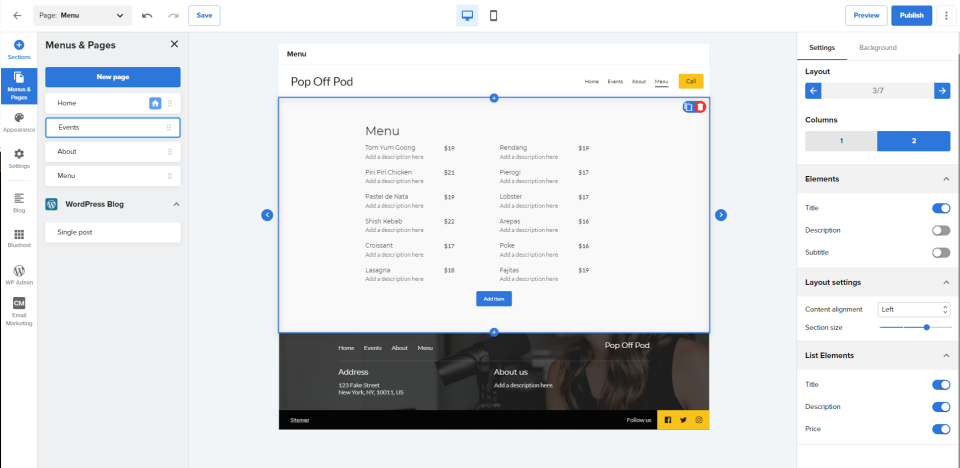
Google Sites, scoring 7.0, offers a user-friendly website builder editor that allows users to create and design websites without needing coding knowledge. It features drag-and-drop functionality, customizable templates, and easy integration with other Google services. However, its simplicity comes with limitations, such as a lack of advanced design customization options and limited third-party integrations.
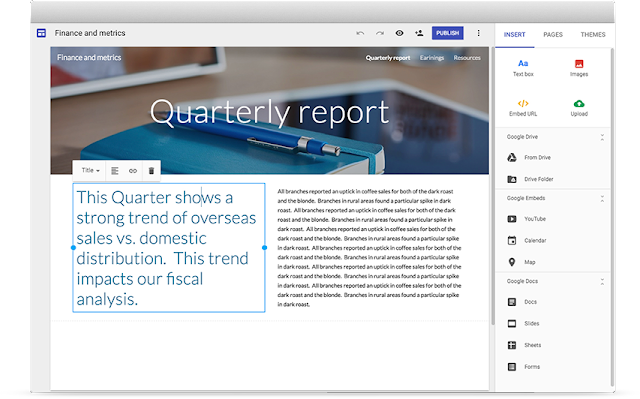
Mobile editor/app
 0
0
 5.0
5.0
🏆
Winner: BlueHost
. Neither Google Sites nor BlueHost offer a dedicated mobile editor app. However, BlueHost does allow users to edit their websites on a mobile browser, albeit with some limitations. This gives BlueHost an edge over Google Sites, which does not offer any mobile editing capabilities. Therefore, if mobile editing is a priority for you, BlueHost would be a better choice.
Product testing options
Product Testing OptionsAssesses the options for trying out platform features before commitment.Score Components:
- Trial quality (40%): Extent and usefulness of the trial or free version.
- Feature accessibility (30%): How many features are available to test.
- Trial duration (20%): Length of the trial period.
- Ease of transition (10%): Smoothness of moving from trial to paid plans.
 6.9
6.9
 6.2
6.2
Overall Result
: Google Sites scores slightly higher than BlueHost with a score of 6.9 against 6.2. Google Sites offers a free version and a 14-day free trial, allowing users to test some premium features. On the other hand, BlueHost does not offer a free or trial version, but it allows users to test premium features within a 30-day refundable period.

|

|
|
|---|---|---|
|
Free Plan |
Yes |
No |
|
Trial Duration |
14 days | No |
|
Testing Premium Features |
Some features during free trial | Within 30-day refundable period |
|
Money Back Guarantee |
No |
30-day money back guarantee |
Price
PriceLooks at the cost-effectiveness and value for money of each platform.Score Components:
- Plan value (40%): What each pricing tier offers.
- Transparency and clarity (30%): Clearness of pricing structures.
- Flexibility of plans (20%): Range of options to suit different budgets.
- Hidden costs (10%): Additional expenses not included in the plan.
 8.1
8.1
 7.2
7.2
Google Sites and BlueHost offer different pricing structures, with Google Sites charging per user and BlueHost offering a range of plans with varying features.

|

|
|
|---|---|---|
|
$0-$10 |
Business Starter ($7.20/month): This plan includes basic features suitable for individuals or small businesses, offering professional email through Gmail, 30GB of storage per user, and video meetings for up to 100 participants. It allows to manage 1 website and there is no limitation on number of pages. Value for price: 6.0 |
No offering at this amount. |
|
$10-$20 |
Business Standard ($14.40/month): Suitable for growing businesses, this plan provides 2 TB of storage per user, video meeting capacity for up to 150 participants with recording features, and access to smart booking pages and shared drives. It allows to manage 1 website and there is no limitation on number of pages. Value for price: 7.5 |
Basic ($15.99/month): Made for a simple website or blog, 1 website with 10GB SSD storage, Free CDN, Free Domain 1st year, Managed WordPress Hosting, Free SSL 1st year and Chat Support Value for price: 6.5 |
|
$20-$30 |
Business Plus ($21.60/month): Designed for larger businesses needing more robust capabilities, offering 5 TB of storage per user, advanced security options, and video meetings for up to 500 participants. It allows to manage 1 website and there is no limitation on number of pages. Value for price: 8.5 |
Choice Plus ($27.99/month): Ideal for multiple sites needing storage, security, backups, 3 websites with 40GB SSD storage, Free CDN, Free Domain 1st year, Managed WordPress hosting, Free SSL, Free Domain privacy 1st year, Malware scanning, daily site backups are free for the 1st year with the purchase of a 12 or 36-month package. Otherwise, users are required to pay a one-time fee of $35.88 for backup services. Value for price: 7.5 |
|
$30-$35 |
No offering at this amount. |
Online Store ($32.99/month): Great for all online selling, built-in eCommerce tools, 3 websites with 40GB SSD storage, Free CDN, Free Domain 1st year, Managed WordPress hosting, Free Domain privacy 1st year, Malware Scanning, Exclusive Theme Store, Store Analytics, Unlimited products, Secure Payment options, Bookings & appointments, Shipping labels, product search and filtering, daily site backups are free for the 1st year with the purchase of a 12 or 36-month package. Otherwise, users are required to pay a one-time fee of $35.88 for backup services. Value for price: 8.5 |
|
$35+ |
No offering at this amount. |
Pro ($39.95/month): Perfect for high traffic, advanced storage, security, 5 websites with 100GB SSD storage, Free CDN, Free Domain 1st year, Managed WordPress hosting, Free SSL, Free Domain privacy 1st year, Malware Scanning, daily site backups are free for the 1st year with the purchase of a 12 or 36-month package. Otherwise, users are required to pay a one-time fee of $35.88 for backup services. Value for price: 9.0 |
location. As a result in rare cases the prices displayed here can differ from the ones you see on their
websites.
Hosting quality
Hosting
qualityExamines the reliability and performance of the hosting solutions.Score Components:
- Uptime (40%): Consistency and reliability of website availability.
- Speed (30%): Loading times and performance.
- Bandwidth and storage (20%): Sufficiency of resources provided.
- Data centers (10%): Quality and distribution of hosting infrastructure.
 8.2
8.2
 8.0
8.0
🏆
Winner: Google Sites
Google Sites and BlueHost both offer reliable hosting services with a 99.9% uptime guarantee. However, Google Sites edges out with its cloud-based managed hosting and a larger network of 21 global data centers, compared to BlueHost’s 6. BlueHost, on the other hand, offers managed WordPress hosting, which may be more suitable for users looking for WordPress-specific features.

|

|
|
|---|---|---|
|
Do they offer hosting? |
Yes, basic storage with 100MB free per site, upgradable with Google Workspace |
Yes, offers a range of hosting options with features designed to support websites at various stages of growth |
|
Data Centers: |
Google operates a total of 21 data centers across the globe: 2 in Asia, 5 in Europe, 13 in US and 1 in South America |
6 data centers: Orem and Provo, Shanghai, Mumbai and Hong Kong, London |
|
Type of hosting: |
Cloud based managed hosting |
Managed WordPress Hosting |
|
Uptime: |
99.9% |
99.9% |
|
Uptime Guarantee: |
Yes, 99.9% |
Yes, 99.9% |
Website Speed Optimization
Website Speed OptimizationEvaluates optimization of website loading timesScore Components:
- PageSpeed Score (30%): Google’s score indicating performance optimization.
- Loading Time (30%): The average time until a website is fully interactive.
- Mobile Optimization (15%): Optimization effectiveness for mobile devices.
- Resource Optimization (15%): Optimizing images, scripts, and other heavy resources.
- CDN Usage (10%): Use of CDN to enhance speed across geolocations.
 3.3
3.3
 6.5
6.5
🏆 Winner: BlueHost
Both Google Sites and BlueHost prioritize website performance and page speed, but BlueHost has a higher website speed optimization score.

|

|
|
|---|---|---|
|
Focus |
Automated Optimization, CDN, Mobile Optimization, Browser Caching, Code Minification, Use of AMP |
CDN, Server Optimization |
|
Performance Tools |
Google Lighthouse, PageSpeed Insights |
Google PageSpeed Insights Integration |
|
Key Strategies |
Automated Optimization, CDN, Mobile Optimization, Browser Caching, Code Minification, Use of AMP |
CDN, Server Optimization |
|
Load Times |
Google does not disclose statistics about website Page Speed scores, or load times |
Varies widely, depending on the optimization, website complexity |
|
Page Speed Scores Range |
Google does not disclose statistics about website Page Speed scores, or load times |
Varies widely, depending on the optimization, website complexity |
|
Core Web Vitals Improvement |
Emphasis on LCP, FID, CLS improvements |
Emphasis on LCP, FID, CLS improvements |
Google Sites, part of the Google Workspace package, is a structured web page-creation tool that allows users to build websites easily without having to know how to code. It uses a drag-and-drop interface and integrates various Google services directly into the websites. Google Sites uses automated optimization, CDN, mobile optimization, browser caching, code minification, and AMP to optimize website speed. However, Google does not disclose statistics about website Page Speed scores or load times.
On the other hand, BlueHost, a comprehensive web hosting service, also offers a user-friendly website builder as part of its suite of tools. It integrates seamlessly with WordPress, allowing for a wide range of customization options and access to thousands of themes and plugins. BlueHost uses CDN and server optimization to enhance website speed. The load times and Page speed scores vary widely, depending on the optimization and website complexity. BlueHost has a higher website speed optimization score than Google Sites, making it the winner in this category.
Get a head start on website creation with AI
Create a custom website tailored to your business needs 10X faster with 10Web AI Website Builder!
Plugins and integrations
Plugins and integrationsMeasures the range and effectiveness of additional plugins and integrations.Score Components:
- Variety of options (40%): Range of available add-ons.
- Integration smoothness (30%): Ease of integrating plugins into the site.
- Quality of plugins (20%): Functionality and reliability of the options.
- Custom integration capabilities (10%): Support for custom or third-party integrations.
 6.4
6.4
 9.1
9.1
🏆 Winner: BlueHost.
With a score of 9.1, BlueHost takes the lead in this category. Its seamless integration with WordPress opens up a vast ecosystem of plugins and extensions, ranging from SEO tools and e-commerce solutions to social media integrations. This makes BlueHost a versatile option for users looking to enhance their website’s functionality and performance.
On the other hand, Google Sites, scoring 6.4, offers a wide array of plugins and extensions, including social media feeds, review displays, chat support, and e-commerce tools. However, it falls short when compared to the extensive range of options provided by BlueHost.

Marketing Features
Design FunctionalitiesRepresents how well each platform allows for creative design and customization of websites.Score Components:
- Template Variety (30%): Range and quality of design templates.
- Customization (30%): Flexibility and options for design alterations.
- User Interface (20%): Ease and intuitiveness of the design process.
- Responsiveness (10%): Adaptability to different devices and screen sizes.
- Innovation (10%): Unique design features and tools.
 2.6
2.6
 7.3
7.3
🏆
Overall Winner: BlueHost
. BlueHost offers a more comprehensive set of marketing features, including SEO tools, email marketing, blogging, social media integration, analytics and reporting, and ads and promotions. Google Sites, while offering some of these features, lacks in areas such as email marketing, blogging, and ads and promotions.
| Marketing Features |

|

|
|---|---|---|
|
SEO Tools |
Basic SEO settings | Built-in and third-party WordPress plugins integrations |
|
Email Marketing |
No | Yes, with the Creative Mail plugin |
|
Blogging |
No | Yes, using WordPress blogging tools |
|
Social Media Integration |
Yes, basic social media links and widgets | Yes |
|
Analytics and Reporting |
Google Analytics integration | Google Analytics and other WordPress plugins |
|
Ads and Promotions |
No | Yes |
Customer Support
Customer supportEvaluates the quality and availability of support options.Score Components:
- Response time (40%): Speed of support responses.
- Support quality (30%): Effectiveness and helpfulness of the support.
- Availability (20%): Range of support channels (phone, chat, email).
- Resource richness (10%): Quality of self-help and educational materials.
 7.2
7.2
 7.6
7.6
🏆 Winner: BlueHost
. In the Google Sites vs BlueHost comparison, BlueHost edges out Google Sites with a slightly higher customer support score of 7.6 compared to Google Sites’ 7.2. BlueHost offers 24/7 support through chat and phone, ensuring users can get help whenever they need it. Their technical assistance is available from 7 a.m. to midnight EST, seven days a week, providing a robust support system for users.
Google Sites, on the other hand, primarily relies on self-service resources like a Help Center and community forums. Direct support, including phone, email, and live chat, is available to Google Workspace customers, with 24/7 support for critical issues depending on the subscription tier. While Google Sites offers comprehensive support for enterprise users, free users have limited access to direct support, making it less accessible compared to BlueHost’s round-the-clock assistance.
Security
SecurityLooks at the platforms’ security measures and data protection.Score Components:
- Data protection (40%): Safeguards for user and customer data.
- SSL and encryption (30%): Implementation of secure connections.
- Compliance (20%): Adherence to industry security standards.
- Regular updates (10%): Frequency of security updates and patches.
 9.3
9.3
 8.3
8.3
🏆
Winner: Google Sites
. Google Sites, with a security score of 9.3, offers robust security measures including SSL encryption, two-factor authentication, and automatic malware scanning. It also benefits from Google’s regular security updates and compliance with international data protection standards. Google’s infrastructure offers DDoS protection and data redundancy, safeguarding against data loss and maintaining site accessibility under heavy traffic.
BlueHost, scoring 8.3 in security, also prioritizes data protection with SSL certificates, regular backups, and additional security features like SiteLock for malware scanning. They provide automated backups to safeguard website data and implement 24/7 monitoring to promptly detect and respond to security threats. However, Google Sites’ comprehensive security measures and higher security score give it the edge in this comparison.
AI Capabilities
AI capabilitiesMeasures the effectiveness of AI-driven features and tools.Score Components:
- Automation efficiency (40%): Impact of AI on streamlining processes.
- Personalization (30%): AI-driven customization for users or customers.
- AI-Assisted design (20%): Role of AI in website design and functionality.
- Data analysis (10%): Use of AI in interpreting user data and analytics.
 0
0
 1.5
1.5

|

|
|
|---|---|---|
|
Personalized Design |
|
|
|
SEO Optimization |
|
|
|
Customer Behavior Analysis |
|
|
|
Sales Predictions |
|
|
|
Inventory Management |
|
|
|
Content Generation |
|
Supports integration with WordPress plugins for content generation |
🏆 Winner: BlueHost
. Although both Google Sites and BlueHost lack built-in AI capabilities, BlueHost has a slight edge due to its compatibility with WordPress plugins, some of which may offer AI-powered features such as content generation. Google Sites, with a score of 0, does not offer any AI capabilities. BlueHost, with a score of 1.5, also does not have built-in AI capabilities but its integration with WordPress plugins provides potential access to AI features.
User Management
User ManagementAssesses the platforms’ capabilities in managing user roles, permissions, and accessibility.Score Components:
- Role Customization (40%): Flexibility in creating and defining user roles and
permissions. - Ease of Management (30%): User interface and tools for managing users.
- Access Control (20%): Effectiveness of access control measures for different user
levels. - Scalability (10%): Ability to manage a growing number of users efficiently.
 7.8
7.8
 4.4
4.4
🏆 Winner: Google Sites
. Google Sites and BlueHost offer different approaches to user management.
- Google Sites allows multiple users to collaborate with different roles, including Owners, who have full control, and Editors, who can modify content but not site settings. There’s no strict limit on the number of users who can edit a site, allowing flexibility in management and development. Viewers can only see the site, with no editing permissions. This structure supports collaborative website building with varied levels of access and control for different users.
- BlueHost does support multi user management, however there’s no mention about number of users or their roles and permissions.
Unfortunately, there are no detailed user roles and access levels tables available for both Google Sites and BlueHost.
Additional Features

|

|
|
|---|---|---|
|
SSL Certificate |
|
|
|
Custom Domain |
|
|
|
Free Custom Domain Included |
|
|
|
International Domains |
|
|
|
Mobile Responsive |
|
|
|
Page Speed |
|
|
|
Website Builder Mobile App |
|
|
|
Convert a Website To An App |
|
|
|
Website Analytics |
|
|
|
Multilingual Sites |
|
|
|
Multiple Users |
|
|
User Feedback
Users consistently praise Google Workspace, particularly Google Sites, for its seamless integration, ease of use, and collaborative features, making it a go-to solution for various professional and educational needs. The platform’s simplicity and user-friendly interface are lauded, enabling effortless website creation and sharing of information within organizations. While some users desire more customization options and additional features, overall, Google Workspace remains highly valued for its versatility and streamlined workflow facilitation.
Users appreciate Bluehost for its comprehensive free offerings, including SSL, subdomains, and custom email, along with additional services like free domain registration and CDN. The platform’s intuitive interface and user-friendly website builder cater to both beginners and experienced developers. However, concerns arise regarding the significant price increase upon renewal, limited free website templates, and unresolved technical issues with poor customer support, hindering users’ ability to effectively manage their websites and businesses. Addressing these concerns could enhance overall user satisfaction with Bluehost.
The making of this blog
We followed a clear, step-by-step process to write and research this article.
FAQ
Which platform is better for beginners, Google Sites or BlueHost?
Can I use both Google Sites and BlueHost for ecommerce?
How do Google Sites and BlueHost differ in terms of customization and design flexibility?
What are the major differences in pricing and value between Google Sites and BlueHost?
Which platform offers better hosting quality, Google Sites or BlueHost?
Is website speed optimization better on Google Sites or BlueHost?
Which platform has better plugins and integrations, Google Sites or BlueHost?
How do Google Sites and BlueHost compare in terms of marketing features?
Which platform provides better customer support, Google Sites or BlueHost?
Which platform is more secure, Google Sites or BlueHost?










